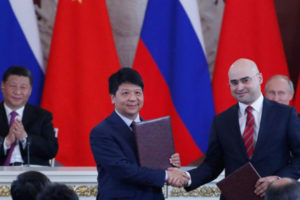Across the Arabian peninsula, thousands of miles of pipes run above and below the desert in one of the world’s most sophisticated production lines for pumping oil from the ground and distributing it around the world. This vast system of oil fields, refineries and ports has largely run like clockwork despite political turbulence across the region.
Then a drone strike claimed by Houthi rebels this week forced the Saudis to temporarily halt the flow of a crucial oil artery to the west side of the country. The assault came a day after mysterious incidents damaged two Saudi tankers and two other ships in a key port in the United Arab Emirates.
These were perhaps the most serious attacks on the kingdom’s oil infrastructure since al-Qaida militants were thwarted trying to blow up a key Saudi facility at Abqaiq in 2006.
While US officials are still trying to determine whether Iran was behind these incidents, the question for the oil market is how well the Saudi and Persian Gulf infrastructure is protected and whether, with tensions building in the region, it could survive a conflict with Iran.
Analysts and executives of Saudi Aramco, the national oil company, say the kingdom has spent heavily to protect the industry that is its lifeblood. Key Saudi installations are tightly guarded and protected by missile batteries and other weaponry. “Security systems were bulked up in the 2000s amid the al-Qaida threat, including the 2006 attack on the Abqaiq facility,” said Ben Cahill, manager for research and advisory, at Energy Intelligence, a research firm. “The country’s oil fields, refineries and pipelines are blanketed by surveillance and remote sensing.”
In light of that security effort, Cahill and other analysts concede that it was eye-opening, even shocking, that a drone apparently launched from as far as 500 miles away in Yemen, managed to cross deep into Saudi Arabia and cause damage.
It was also worrisome and even embarrassing that someone managed to damage tankers in waters off Fujairah, a vital port in the UAE where ships take on fuel and provisions on their way in and out of the Persian Gulf.
Despite the security spending of the last decade, rapid changes in technology may mean that the Saudi infrastructure is more exposed than previously thought, analysts say. United Nations experts have estimated, for instance, that drones used by the Houthis have a range of nearly 1,000 miles, allowing them to reach well into Saudi Arabia. “The simple fact that they managed to reach tankers and a pipeline” is meaningful, said Riccardo Fabiani, a geopolitical analyst at Energy Aspects, a market research firm. “It means they could strike at the heart of Saudi interests if they wanted to.”
Iran is well-placed for inflicting pain in the no-war-no-peace existence in the region. Analysts say it is proficient at using relatively cheap unconventional weapons like drones and speed boats, and at covering its tracks. It can also make use of proxies including the Houthi rebels, who claimed responsibility for the pipeline attack.
Analysts say drones could prove to be a nuisance for producers like the Saudis. It would be difficult, if not impossible, to protect an entire pipeline system, and even concentrating air defence units around key points like pumping stations, which were hit this week, would mean taking these defences from somewhere else.
Drones may also be able to evade the kingdom’s main air defences, which are intended to repel missiles and aircraft rather than smaller objects. Jeremy Binnie, a Middle East and Africa defence specialist at Jane’s Defense Weekly, said satellite imagery showed that the key Saudi export terminal at Ras Tanura was guarded by batteries of sophisticated US-made Hawk surface-to-air missiles. But these weapons “might not be able to engage the UAVs (drones) that Iran has developed with small radar cross sections,” he said.
Another concern is that Iran, which is regarded as skilled in digital hacking, could use cyber warfare to damage the petroleum infrastructure of Saudi Arabia and its neighbours.
At Saudi Aramco, activities like drilling wells, pumping oil to the surface, and loading the fuel on tankers can all be monitored and managed remotely. Such sophistication, though, may also create openings for attack. “A lot of those movements are run out of a central command centre at Saudi Aramco headquarters,” said Phillip Cornell, a fellow at the Atlantic Council, a Washington-based research institution, who previously worked at Aramco as a senior corporate planning adviser.
Cornell said Aramco officials suspected Iran was responsible for a cyberattack earlier in this decade and that “there has been a lot of investment to reinforce those cybersecurity defenses.”
However, analysts say the cyber vulnerabilities remain a major worry. “I think cyber is the really underappreciated risk,” said Helima Croft, an oil analyst at RBC Capital markets, an investment bank.
Cyber attacks, for instance, could play a surprisingly large role in the event of conflict, gumming up the oil system or even causing damage. “Iran has significant cyber capabilities and in the event of a significant US military action against Iran, one could expect that they might deploy these capabilities against the US and its allies,” said John MacWilliams, who was an associate deputy secretary and chief risk officer in the Department of Energy in the Obama administration.
MacWilliams said the Pentagon monitors Iran’s cyber skills and likely has plans to counter them. “It is one more important reason that containing military action from spreading quickly to a larger conflict may prove difficult,” he said.
In the event of a major conflict, some analysts figure that the large presence of US military forces in the area would mean that Iran would have only limited success if it tried to stop oil flows from the Persian Gulf. “Iran is still a very limited military power if things escalate,” said Anthony H Cordesman, a gulf defence expert at the Center for Strategic and International Studies in Washington. Cordesman added that the consequences of a conflict in the region “would be higher prices and limited flows, not a prolonged closing of the gulf.”
Washington’s sanctions on Iran have already more than halved the country’s oil sales. As they continue to fall, Tehran may be tempted to take greater risks. “The Trump administration really needs to understand what it is doing by clamping down on Iran,” said Jim Krane, an energy fellow at Rice University’s Baker Institute. “If Iran does not have any exports, it has a lot less to lose.”






















